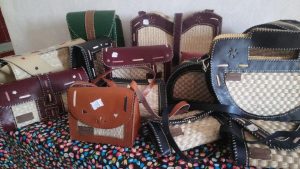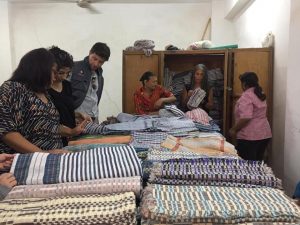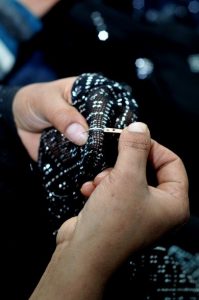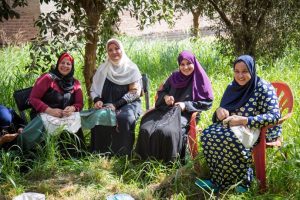 Egypt, Governorates of Sohag and Assiut – Within the Italian-Egyptian Debt Swap Program (IEDS) a particularly important role is played by the initiatives promoted by the Egyptian civil society and by Italian NGOs. On November 2nd, 3rd and 4th the staff of AICS Cairo and the Technical Support Unit of the IEDS, carried out a joint monitoring mission to two initiatives carried out by the NGOs COSPE, project “HOPE – Handicraft and Organic agriculture Producers’ Empowerment” and MAIS NGO , project “Becoming Leaders Project: Creation of working opportunities and sustainable economic development for women in Upper Egypt“.
Egypt, Governorates of Sohag and Assiut – Within the Italian-Egyptian Debt Swap Program (IEDS) a particularly important role is played by the initiatives promoted by the Egyptian civil society and by Italian NGOs. On November 2nd, 3rd and 4th the staff of AICS Cairo and the Technical Support Unit of the IEDS, carried out a joint monitoring mission to two initiatives carried out by the NGOs COSPE, project “HOPE – Handicraft and Organic agriculture Producers’ Empowerment” and MAIS NGO , project “Becoming Leaders Project: Creation of working opportunities and sustainable economic development for women in Upper Egypt“.
Both initiatives aim to promote and improve the activities of different groups of artisans, through trainings and technical assistance, micro-credit services and the creation of a local network to support local handcraft’ production. The projects are both located in Upper Egypt, which has the highest poverty rate in the country and where a highly conservative mentality often limits women’s empowerment opportunities. The initiatives offered new tools to promote greater participation of women in the economic life. Through the projects, novelties have been introduced, such as new designs and new products, innovative production techniques and marketing strategies. As a result, sales have increased, and products have entered successfully into new markets. Moreover, the initiatives have positively affected the protection of cultural heritage and traditional ways of production.
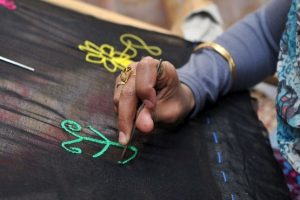 The stories of Nawal and Afef show how development projects not only promote improvements in the dimension of productivity, but also contribute to a real change in people’s lives in terms of greater self-esteem, social recognition, personal fulfillment and happiness:
The stories of Nawal and Afef show how development projects not only promote improvements in the dimension of productivity, but also contribute to a real change in people’s lives in terms of greater self-esteem, social recognition, personal fulfillment and happiness:
Nawal: “I come from a small rural village. I studied at an Islamic school. My mother died, I married my uncle’s son and I lived inside my home for ten years. My husband wouldn’t let me do anything. I did household work and never left home except to take my kids to the doctor. My husband mistreated me. Before I was a living dead! There was never anything new. The morning was the same as the evening. I was like an animal at home. I wanted to go to work, my husband wouldn’t let me. I started going secretly to the training courses of Tally (traditional art inspired to the Pharaonic and Coptic tradition) of the project, thanks to which I was able to start working from home. I concentrated on my work, forgetting about the rest, and began to contribute financially to family expenses. Thank God, I became an active part of the family economy and could therefore decide to buy some extra things for my two children. This changed the relationship with my husband, who started to leave me a little freer. Now it is even better with my family and my brother. I started going out a little more, meeting other people. At one point, I realized that I was no longer alone. I am very grateful to the project, to all the techniques I learned and to Naglaa, the project coordinator, because she was close to me. I hope there are other training courses and the possibility of accessing the micro credit program. ”
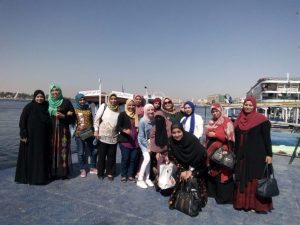 Afes: “I have one son and one daughter. Then my husband died and left me debts. I was always sad, I was crying all the time and there was no hope. In the South of Egypt, we have the tradition that when the husband dies, the wife marries the husband’s brother. The future is in the hands of God, it does not depend on me, but I would like to become a teacher and make a project of my own. Some girls from the village asked me to teach them some techniques and so I gave them a bit of cloth. Thanks to the project, I realized that I had to respect myself, listen to my needs, not let me go and let no one push me around. I realized that I didn’t have to get married again and that I could work. This is what I did: I didn’t get married again and I started working. I took two micro credits, bought the fabric and started my project. I met other artisans and in particular a bag manufacturer named Nura. I went to work with her in Cairo. It was the first time I left my region and went to Cairo. I had the feeling of being faced with a very difficult thing, but then from inside everything became much easier. Since then I no longer wanted to go home or sell products from home, but I wanted to travel. I met a friend who took part in the fairs and I also started to participate to events organized by the Ministry of Finance and others. There was a feeling of success and I gained some more money. Before people didn’t have a big consideration of myself. Then I started to be successful, they started inviting me to television, I’m very proud. Now I hear people in my neighborhood saying: – here lives Afes, the one who goes on television! -. My children are very proud of me. At one of these fairs, we took a picture together and now they show it to all their friends! ”
Afes: “I have one son and one daughter. Then my husband died and left me debts. I was always sad, I was crying all the time and there was no hope. In the South of Egypt, we have the tradition that when the husband dies, the wife marries the husband’s brother. The future is in the hands of God, it does not depend on me, but I would like to become a teacher and make a project of my own. Some girls from the village asked me to teach them some techniques and so I gave them a bit of cloth. Thanks to the project, I realized that I had to respect myself, listen to my needs, not let me go and let no one push me around. I realized that I didn’t have to get married again and that I could work. This is what I did: I didn’t get married again and I started working. I took two micro credits, bought the fabric and started my project. I met other artisans and in particular a bag manufacturer named Nura. I went to work with her in Cairo. It was the first time I left my region and went to Cairo. I had the feeling of being faced with a very difficult thing, but then from inside everything became much easier. Since then I no longer wanted to go home or sell products from home, but I wanted to travel. I met a friend who took part in the fairs and I also started to participate to events organized by the Ministry of Finance and others. There was a feeling of success and I gained some more money. Before people didn’t have a big consideration of myself. Then I started to be successful, they started inviting me to television, I’m very proud. Now I hear people in my neighborhood saying: – here lives Afes, the one who goes on television! -. My children are very proud of me. At one of these fairs, we took a picture together and now they show it to all their friends! ”
More information on the projects:
FB Page project “HOPE” by COSPE: www.facebook.com/pg/COSPE.hopeproject/posts/
FB Page project “Becoming leaders” by MAIS: www.facebook.com/BecomingLeaders/
